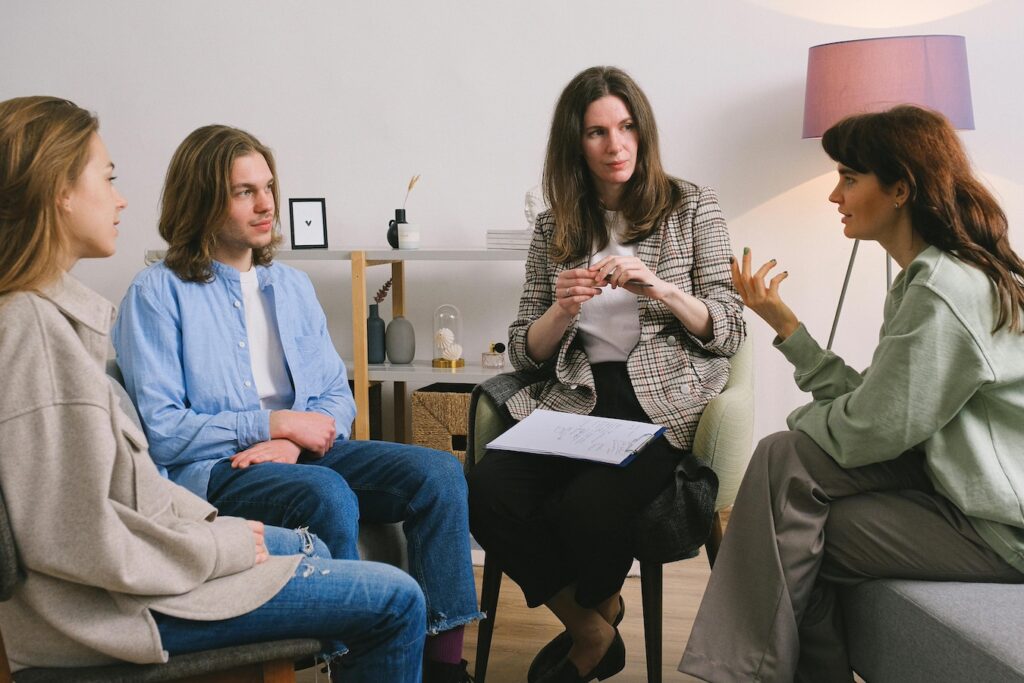“Psychological safety is the belief that in a group you’re a part of you can ask a question,
make a mistake, take a risk, ask for help without fear of embarrassment, exclusion, or retribution.”
The Psychological Safety Playbook
Interested to learn more about Psychological Safety and the different it makes in the workplace? I’ve curated on this page a short list of resources about this important topic – articles, videos, podcasts, and books.
Get in touch if you want to learn more, or to find out how to bring practical workshops and training to your organization!
The Psychological Safety Playbook
Free Resources view
“Creating Safe Spaces: How Psychological Safety Transforms Workplaces” Have a Seat… Podcast
“How to Build and Support Psychologically Safe Workplaces” Project HR Podcast
General Resources
Psychological Safety Newsletter (weekly) view and subscribe
Free resources on Psychological Safety view
Amy Edmondson “Building a psychologically safe workplace” https://www.youtube.com/watch?v=LhoLuui9gX8&t=20s
Amy Edmondson and Mark Mortensen “What psychological safety looks like in a hybrid world” Harvard Business Review, April 19, 2021, https://hbr.org/2021/04/what-psychological-safety-looks-like-in-a-hybrid-workplace
Amy Edmondson The Fearless Organization: creating a psychologically safety in the workplace for learning, innovation, and growth (New York: Wiley, 2018)
Communicate Courageously
Susan David, “Should You Share Your Feelings During a Work Conflict?,” Harvard Business Review, December 6, 2017, hbr.org/2017/12/should-you-share-your-feelings-during-a-work-fight
Nilofer Merchant, “Don’t Demonize Employees Who Raise Problems,” Harvard Business Review, January 30, 2020, hbr.org/2020/01/dont-demonize-employees-who-raise-problems
Sigal Barsade and Olivia A. O’Neill, “Manage Your Emotional Culture,” Harvard Business Review, February 2016, hbr.org/2016/01/manage-your-emotional-culture
Daniel Goleman, Emotional Intelligence: Why It Can Matter More Than IQ (New York: Bantam, 2005).
Jennifer Aaker and Naomi Bagdonas, “Why Great Leaders Take Humor Seriously,” TED, January 13, 2022, ted.com/talks/jennifer_aaker_and_naomi_bagdonas_why_great_leaders_take_humor_seriously
Master the Art of Listening
Jack Zenger and Joseph Folkman, “What Great Listeners Actually Do,” Zenger Folkman website, 2019, zengerfolkman.com/wp-content/uploads/2019/08/What-Great-Listeners-Actually-Do_WP-2019.pdf.
Douglas Stone, Bruce Patton, and Sheila Heen, Difficult Conversations: How to Discuss What Matters Most (New York: Penguin, 2010).
Kate Murphy, You’re Not Listening: What You’re Missing and Why It Matters (New York: Celadon Books, 2020).
Rosalie Puiman, The Mindful Guide to Conflict Resolution: How to Thoughtfully Handle Different Situations, Conversations, and Personalities (New York: Adams Media, 2019).
Maria Ross, The Empathy Edge: Harnessing the Value of Compassion as an Engine for Success (Vancouver: Page Two, 2019).
Manage Your Reactions
Susan David, Emotional Agility: Get Unstuck, Embrace Change, and Thrive in Work and Life (New York: Avery, 2016).
Shirzad Chamine, Positive Intelligence: Why Only 20% of Teams and Individuals Achieve Their Potential and How You Can Achieve Yours (Austin: Greenleaf Book Group, 2012).
Tom and David Kelley, Creative Confidence: Unleashing the Creative Potential Within Us All (New York: Crown Publishing Group, 2013).
James W. Tamm and Ronald J. Luyet, Radical Collaboration: Five Essential Skills to Overcome Defensiveness and Build Successful Relationships (New York: HarperCollins, 2020).
Justin Bariso, EQ Applied: The Real-World Guide to Emotional Intelligence (Germany: Borough Hall, 2018).
Embrace Risk and Failure
Gary Klein, “Performing a Project Premortem,” Harvard Business Review, 2007, hbr.org/2007/09/performing-a-project-premortem.
Rosamund Stone Zander and Benjamin Zander, The Art of Possibility: Transforming Professional and Personal Life (New York: Penguin, 2002).
Carol S. Dweck, Mindset: The New Psychology of Success (New York: Ballantine Books, 2007).
Alina Tugend, Better by Mistake: The Unexpected Benefits of Being Wrong (New York: Riverhead Books, 2011).
Design Inclusive Rituals
Rajkumari Neogy, “Exclusion and Trauma Are Impacting the Workforce. Here’s How to Fix It and Heal,” Fast Company, July 13, 2020, fastcompany.com/90526659/exclusion-and-trauma-are-impacting-the-workforce-heres-how-to-fix-it-and-heal
Dolly Chugh, “How to Have More Inclusive Meetings over Zoom,” TED Ideas, October 20, 2020, ideas.ted.com/how-to-have-inclusive-meetings-over-zoom/.
Mark Smutny, Thrive: The Facilitator’s Guide to Radically Inclusive Meetings (Sherman, CT: Emerald Lake Books, 2021).
Johnnie Moore, “What to Do When Loudmouths Are Ruining Your Meetings,” Fast Company, August 23, 2021, fastcompany.com/90666163/what-to-do-when-loudmouths-are-ruining-your-
meetings.
Juliet Bourke and Andrea Titus, “Why Inclusive Leaders Are Good for Organizations, and How to Become One,” Harvard Business Review, March 29, 2019, hbr.org/2019/03/why-inclusive-leaders-are-good-for-organizations-and-how-to-become-one.

